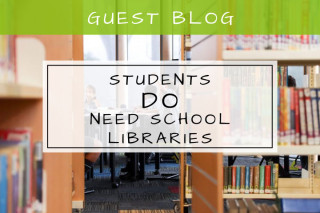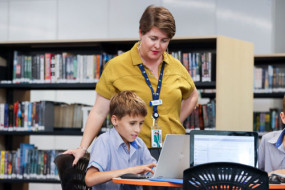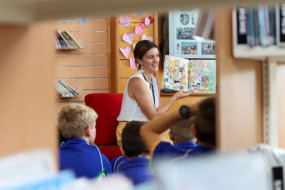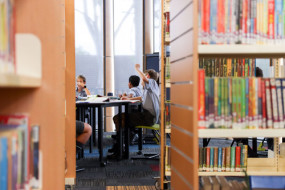- Your School Type
- Solutions
- Resources
- Blog
- Events
- More
- Contact Us
- Book a Demo
- Get a Quote

In this blog post, Sarah McCallan, Head of Library Services at Ambrose Treacy College, discusses the importance of the school library and the ways that school libraries contribute to the lives and learning of students. This article was previously published on the Ambrose Treacy College website February 2020, republished with permission.

Recently, the Australian School Library Association shared a news item from a commercial television station which reported that a newly opening high school in Queensland was to be a paperless, book-less and library-less *‘school of the future’*. Imagine the collective horror of school librarians across Australia when we saw that piece! We all had to undo the top buttons of our cardigans when we read that.
But seriously, it seemed to me, in that moment, that all of the hard work being done in school libraries was dismissed with one double-tap of a BYOD iPad. I have subsequently been reliably informed that the library will be opened in the second half of the year, but the apparent glee with which the absence-of-library was reported makes me worried. Why does it matter, I hear you ask? It matters very much to our students and teachers, and I am very excited and privileged to be working at a college which deeply values libraries and the role of teacher librarians. Here are some really important ways that school libraries contribute to the lives and learning of students.

I am fairly confident that most parents would have read or seen something in the media over the last few years about Australia’s declining literacy rates. Last year’s reports on Australia’s PISA results (the measure used by the OECD to determine levels of literacy and numeracy) showed that Australian students are a year behind students 10 years ago in science, maths and reading. According to an article in The Conversation, around 41% of Australian 15 year olds have failed to meet minimum national standards in reading.
As a passionate teacher librarian and advocate for literacy education, I cannot help but make the connection between these statistics and reports of an “alarming” loss in the number of qualified teacher librarians in schools across the country. There is “abundant” data that shows the positive impact school libraries and teacher librarians have on literacy outcomes. A current campaign run by ACT teacher librarian Holly Godfree (Students Need School Libraries) argues that a reinvigorated school library is the “missing piece of the puzzle” in achieving literacy targets.
As well as the more traditional (and vitally important) skills like literacy and numeracy, there are also a swag of “soft skills” that are equally valuable. In a competitive and changing workplace, it’s these soft skills that can set you apart. Examples of these 21st Century skills include things like creativity, collaboration, critical thinking, and empathy. These skills are the bread and butter of the teacher librarian, who is trained to teach others to work together, to locate and critically evaluate information, and to promote a love of reading.
Can your son identify “fake news” in the endless sea of information that is the internet? Can he critically evaluate the news items he sees and get to the facts? Again, this is where the school library and staff can help.
I recently had the pleasure of listening to a presentation by Educational Futurist Tony Ryan in which he named empathy as the most valuable “soft skill” of the 21st century. It is no coincidence then, as famous book-lover Barack Obama tells us, that studies show readers tend to be more empathetic than non-readers.

All the passionate staff at the ATC libraries can help your son find a book that he connects with, even reluctant readers. In a world that some say is suffering from an “empathy deficit”, school libraries can gently encourage students to experience life in someone else’s shoes through the power of a great book.
There are a myriad of other ways in which a school library and staff can help students achieve their best, and develop into well-rounded and capable citizens. At Ambrose Treacy College, our students have the absolute privilege of two beautiful, well-resourced libraries (Mt Sion and Westcourt) where the boys can access the help of passionate staff, relax in a pleasant environment, complete homework and assessment tasks, and collaborate with their teachers and peers. Not everyone in Australia has this opportunity, and I encourage anyone interested to visit the Students Need School Libraries website to see how to engage with this excellent campaign.
For those of you who would like to do some further reading on this topic, can I suggest these articles: Students Need School Libraries; Children’s Books Daily; Australian School Library Association Advocacy Information; How to Spot Fake News, and ABC News article – teacher librarians a dying breed.
Happy reading!
Sarah McCallan
Head of Library Services